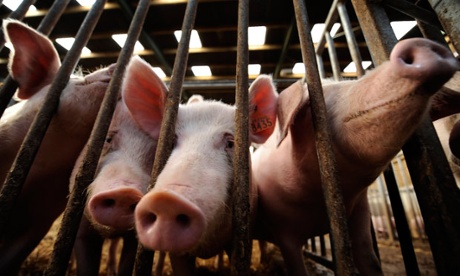A group of powerful City investors who together control more than $1tn in assets have written to leading fast food, pub and restaurant chains urging them to take immediate action to reduce antibiotic use in their meat and poultry supply chains.
The financiers, including Aviva Investors, Strathclyde Pension Fund and Coller Capital, are particularly concerned about the use of antibiotics classified as “critically important” to human health and the routine use of drugs on factory farms to prevent disease.
Experts believe the drugs’ use in farm animals is linked, via the food chain, to the spread of antibiotic-resistant infections in humans. The chief medical officer, Dame Sally Davies, has described an “apocalyptic scenario” in which people going for routine operations die because antibiotics are no longer effective at stopping infections.
Meanwhile the World Health Organisation (WHO) has warned that antibiotic use in livestock production is contributing to the global threat of a “post-antibiotic era”.
The shareholder action comes as figures obtained by the Bureau of Investigative Journalism reveal an increase in cases of a strain of campylobacter – Britain’s most widespread cause of food poisoning – resistant to a key antibiotic in human patients.
The new figures, released by Public Health England under the Freedom of Information Act reveal that UK human campylobacter infections found to be resistant to the antibiotic ciprofloxacin were at their highest level for a decade last year. Infections typically come from uncooked meat, especially poultry. They are generally mild but can be fatal in young children, older people or people with a compromised immune system.
Of the 17,332 human campylobacter cases tested in 2015 for resistance to ciprofloxacin, 48% had some degree of resistance to the drug. In 2005, this figure was 30%.
Separate data released by the Veterinary Medicines Directorate in November on sales of animal medicines in the UK suggests that the use of antibiotics classed as “critically important” by the World Health Organisation on farms is still widespread and is not dropping. That is despite concerns that these are among the few options that doctors have for treating some bacterial infections in people.
The investors’ letter points out that around 80% of all antibiotics used in the US and 45% in the UK are given to farm animals, adding, “there is a significant risk of drug-resistant bacteria developing as a result”.
“Whilst we agree that antibiotics should be used for the treatment of sick animals, they should not be used to support irresponsible practices such as growth promotion or routine disease prevention of animals kept in closely confined and unsanitary conditions,” it says.
The investors behind the letter say they are worried that growing consumer awareness of the issues could damage the companies’ reputations. The letter says: “Negative media coverage and civil society campaigning can harm sales and affect consumer loyalty; a matter of particular concern for fast-food chains whose customers can easily shift their spending habits.”
The letter also points out that future regulations to curb the veterinary use of antibiotics may catch out companies that are slow to act. “There will be cost savings and reduced disruption for forward-looking companies who have established relationships with higher- welfare producers,” it reads. Both of these issues could hit the value of the food companies and so the return for investors.
Several of the companies contacted, including McDonald’s and Domino’s Pizza say they have already begun to develop policies for tackling antibiotic use on farms.
Other firms that were sent letters included Burger King, the pub giants JD Wetherspoon, and Mitchells & Butlers, the company behind the Harvester, All Bar One and Toby Carvery chains.
Jeremy Coller, the founder of Coller Capital, who was the behind the letter, which was sent last month but has not previously been made public, said: “These large food companies are key ingredients in the portfolios of most of our pensions and savings – thus it is a case of proper risk management to ask them to work out how they will meet this challenge.
“The world is changing, regulation on antibiotic use is set to tighten and consumer preferences are shifting away from factory-farmed food. As stewards of these food companies and responsible investors, we want to protect both human health and shareholder value.”
Dr James Davies, a Tory MP who is also trained as a GP, said that the over-use of antibiotics in farm animals was a great concern. “The use of some of these antibiotics for purposes such as growth promotion is clearly unnecessary from a veterinary point of view,” he said.
“It is very interesting that City investors are expressing concern about the use of antibiotics amongst animals in the supply chain of food outlets with which they are associated. This suggests an increasing realisation of the scale of the problem posed by antimicrobial resistance and the fact that irresponsible antibiotic use in animals is now being recognised more widely as a significant risk,” he added.
The shareholder letter follows research by two groups – ShareAction and Farm Animal Investment Risk & Return – into corporate attitudes around antimicrobial resistance.
In a report due on Monday, the groups say that although perceptions are shifting and the financial risks associated with the over-use of antibiotics are gaining profile, “what remains clear is that a majority of companies operating in the restaurant and fast food sectors currently depend – to varying degrees – on the prophylactic use of antibiotics within their global meat and poultry supply chains”.
In response to the letter, a spokesperson for JD Wetherspoon said: “The use of artificial growth-promoting substances, including antibiotics, is prohibited across all our livestock supply chains.”
A spokesperson for Mitchell & Butlers said: “The prophylactic use of antibiotics in livestock production is an important issue to Mitchells & Butlers and one that we are reviewing across all species, as part of our sourcing policy. We have been working with our poultry suppliers to define our antibiotic policy and we are continuing to develop this policy, species by species.”
A spokesperson for McDonald’s said it announced last year that in its North American operations, it would “only source chickens raised without antibiotics important to human medicine”. For Europe, she added: “Since 2001 ... we have been monitoring, controlling and reducing the use of antibiotics among chickens in our supply chain.
“In fact, we have a policy which bans the use of the highest priority critically important antibiotics for human medicine (as designated by WHO) in our chicken supply chain by 2018.”
A Domino’s Pizza spokesperson said: “[Our] suppliers use antibiotics only when necessary to treat diseases. This is done under strict veterinary supervision. Antibiotics are not used to prevent disease or as a growth promoter.”
A spokesperson for Burger King said: “We are currently in the process of developing the sustainability and responsibility framework for Restaurant Brands International for release in 2016. Our products currently comply with all regulations regarding the use of antibiotics.”











